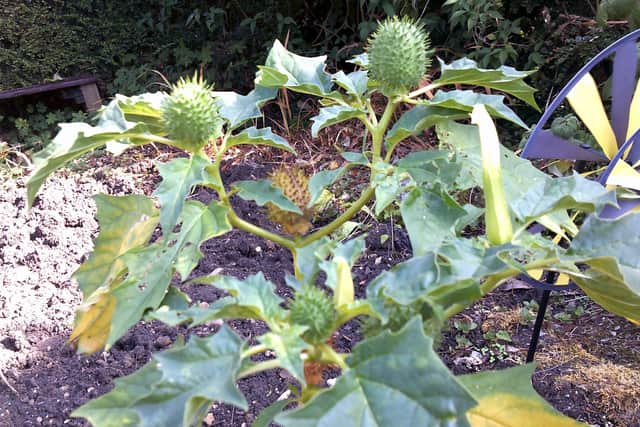Warning after 'highly poisonous' weed found growing in Leighton Buzzard garden
This article contains affiliate links. We may earn a small commission on items purchased through this article, but that does not affect our editorial judgement.
and live on Freeview channel 276
A ‘highly poisonous’ weed that can cause skin lesions has been found growing in a Leighton Buzzard garden.
The Royal Horticultural Society warns that all parts of the ‘Devil’s Snare’ weed – which has hallucinogenic properties are ‘highly poisonous’, particularly the seeds.
Advertisement
Hide AdAdvertisement
Hide AdGardener Neil Cairns discovered the plant, officially known as Datura stramonium, in his garden.


He said: "I took photos and contacted Leighton-Linslade's very own botanist, Stephen Jury. He told me it is a 'Spiny Apple' or 'Jimson Weed', also known as Datura stramonium - a highly poisonous plant and a rampant weed.
"It is about 2ft and has leaves very like the Canadian maple tree.
"I assume it was a present from a bird. I was advised to handle it with care as it can cause skin lesions."
What is Devil’s Snare?
Advertisement
Hide AdAdvertisement
Hide AdAlso commonly known as a Thorn Apple, Devil’s Snare flowers from July to October with wide, funnel-shaped petals (usually white).
The Royal Horticultural Society advises: "The potentially harmful poisonous and hallucinogenic properties of this plant can sound alarming, especially when made much of in the media.
"The leaves and seed pods also look exotic and alien. In fact, this is quite a small plant and not very invasive in Britain.
"Common sense precautions limit risk factors so that gardeners need not be too alarmed by this weed."
Advertisement
Hide AdAdvertisement
Hide AdIt is thought that the Devil's Snare seed retains its viability "for many years" when buried and germinates when the soil is disturbed.
The seedpods themselves are large and spiny (hence the common name thorn apple).
